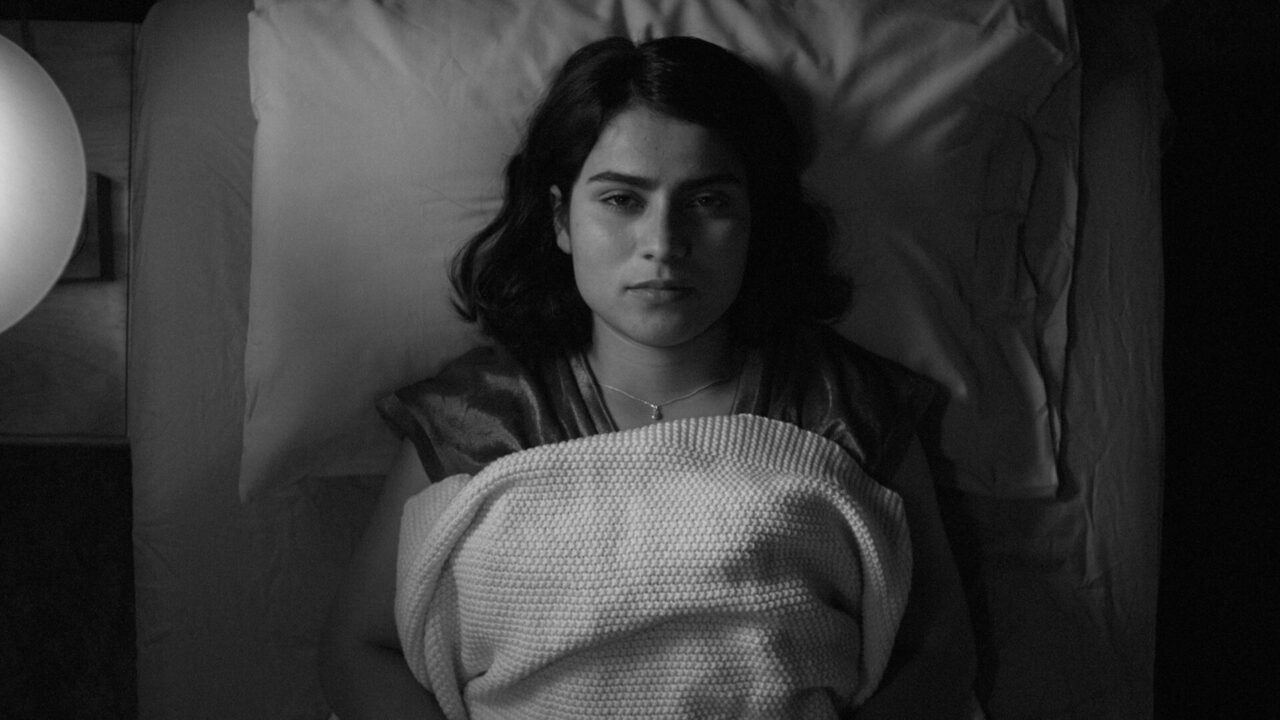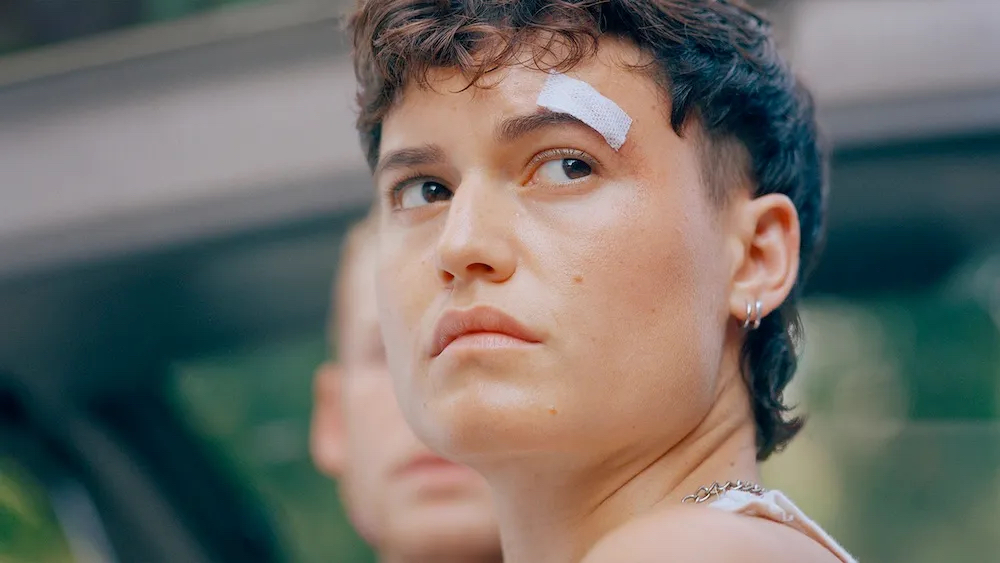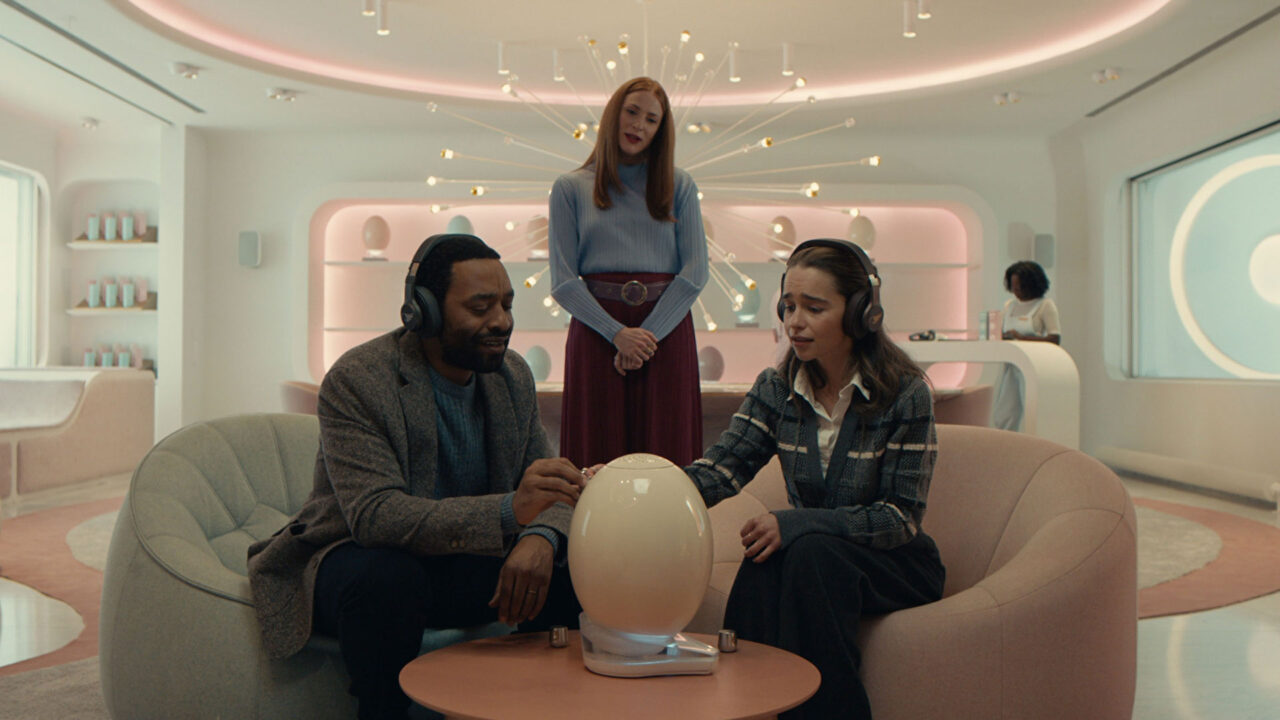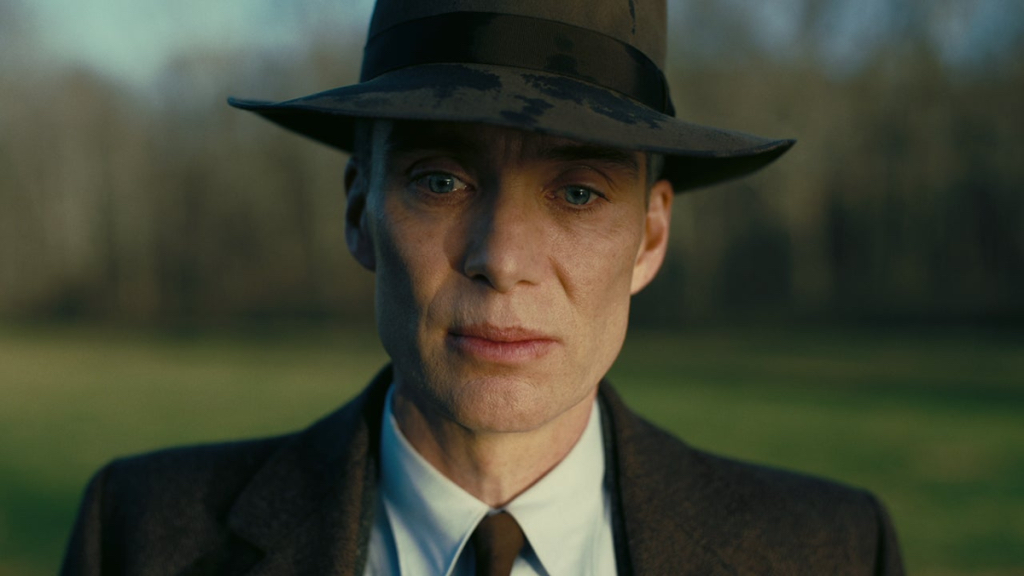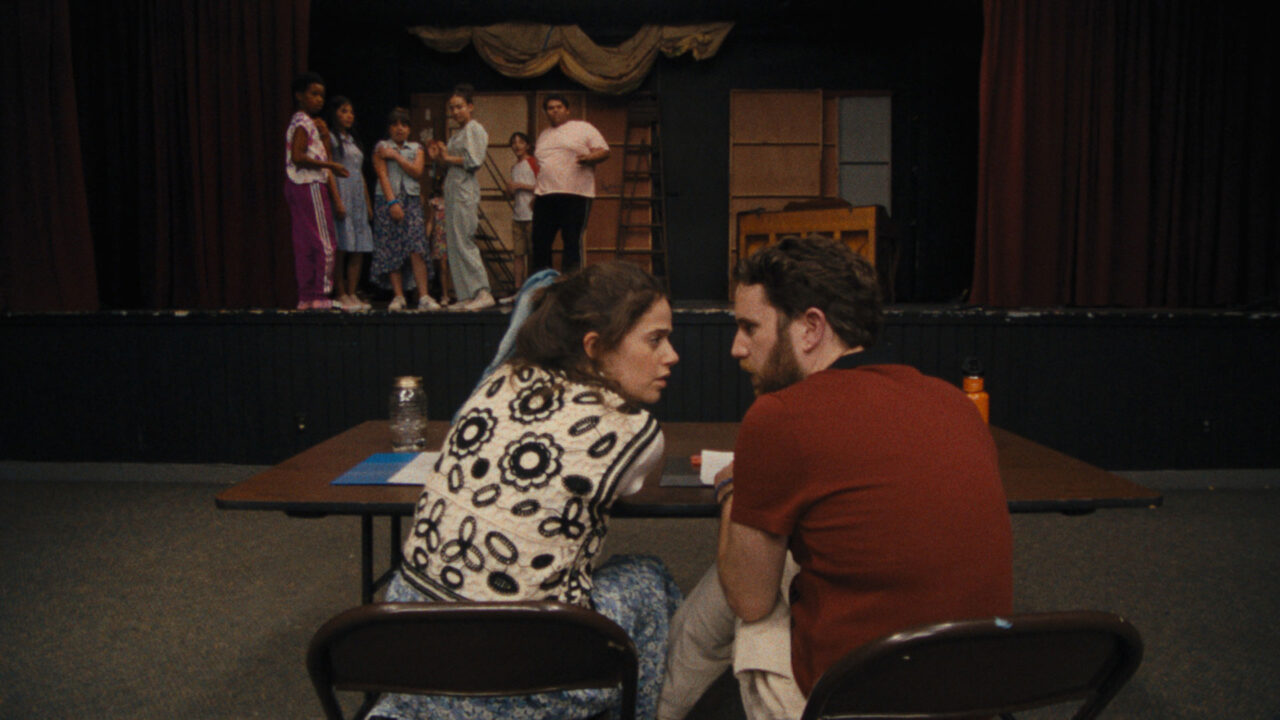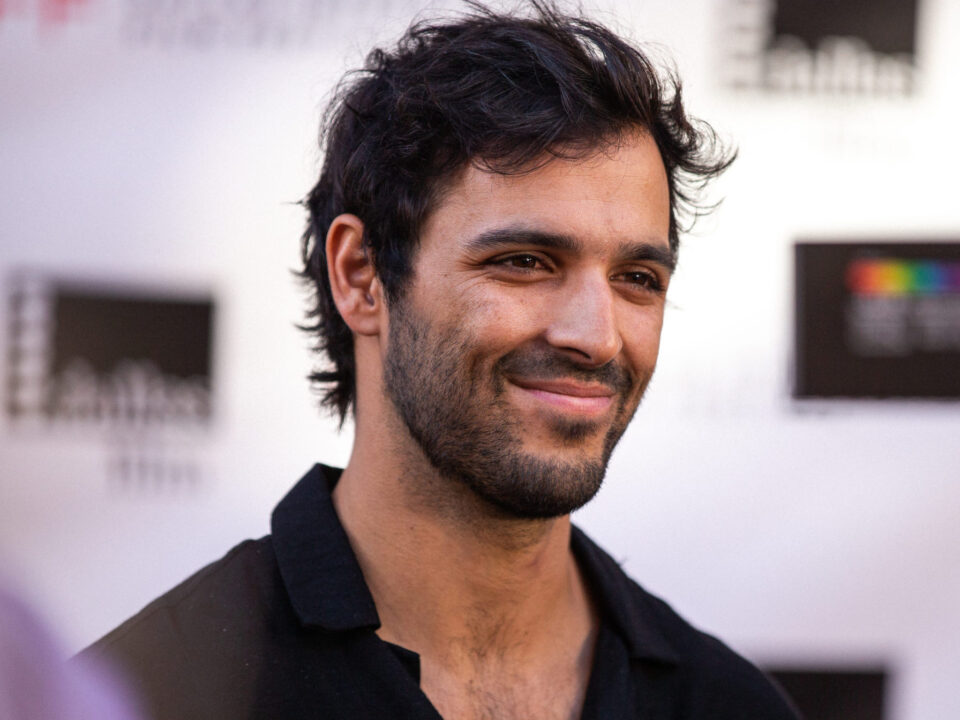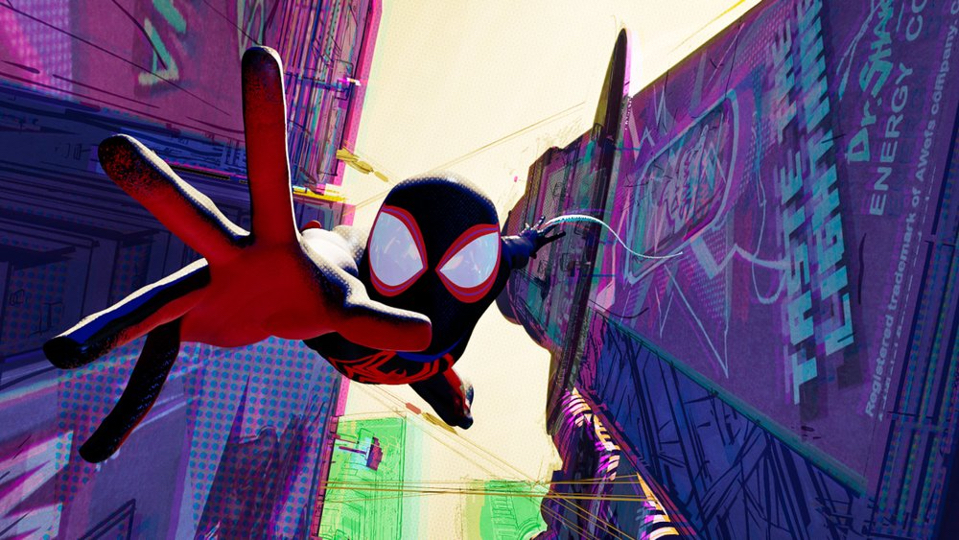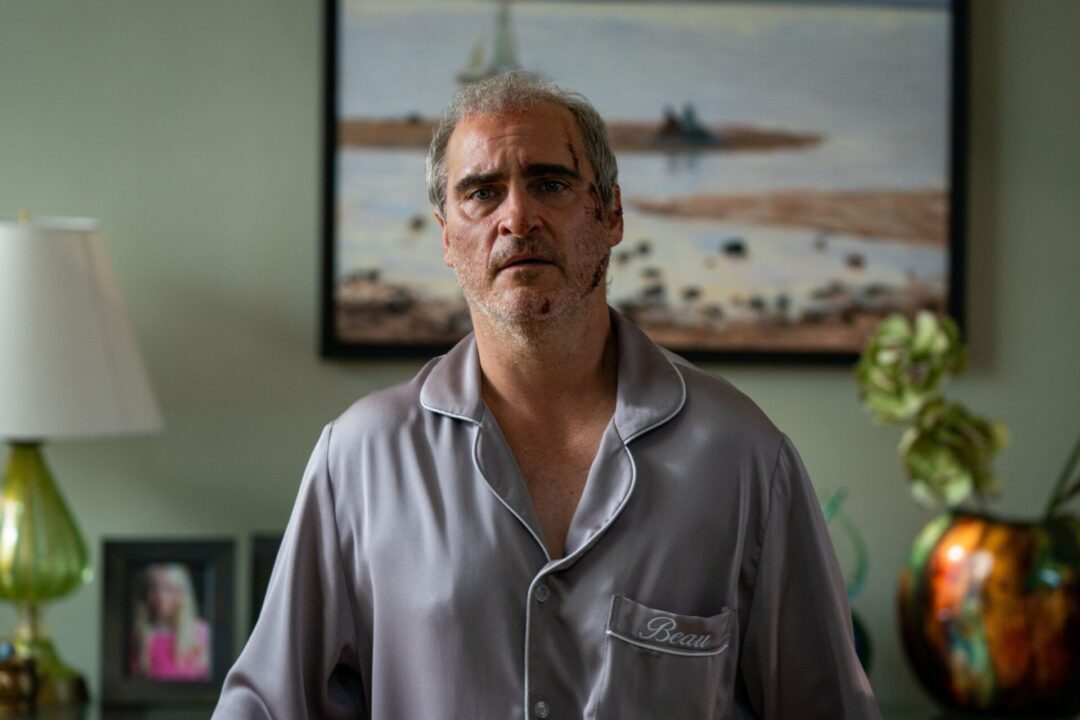Fremont: A Whimsical Story of an Afghan Immigrant
Portraying the mundanities of everyday life in a humorous, smartly observed, and profoundly moving way is what makes the film Fremont so magical.
A mostly slice-of-life film told through a series of funny and touching vignettes, the modestly made Fremont follows the life of a young Afghani immigrant in the US. Photographed in fabulous black and white, Fremont draws comparisons to the work of John Cassavetes and personally made me think of Frances Ha. Premiering at this year's Sundance Film Festival, it was the most endearing and enjoyable film I saw.
Donya (Anaita Wali Zada) is a young Afghani woman living in the quiet town of Fremont, California. She lives alone but among a strongly concentrated Afghani community. She takes the bus into San Francisco where she works a low-thrills job packaging cookies at a fortune cookie factory, passing the time listening to small talk from her quirky friend and the encouragement from her good-hearted Chinese immigrant boss.
A largely quiet presence, Donya listens to the thoughts and opinions of a revolving cast of characters. It's a wonderful storytelling device, allowing us to see this unique slice of Americana through her eyes.
Donya's quietness should not be mistaken for passiveness–and certainly, not for weakness. With piercing eyes, she has a fixed, almost steely gaze–something almost challenging. But as the camera captures, there's an enduring warmness and intelligence that lies underneath. Donya watches the world with both curiosity and caution as if constantly on guard.
To this end, we see that Donya has trouble sleeping and wants to get sleeping pills. Before she can receive the prescription, she must sit through weekly sessions with a psychiatrist (Gregg Turkington). These repeating sessions allow us to learn more about the closed-off Donya. And it's here where the film makes its reveal: Donya fled from the threat of the Taliban after working as a translator for the US Army.
https://youtu.be/wu8CzVfik-4?si=a_SSpDQ9TFl4UHR7
Instantly, Fremont explodes into a global story, widening out beyond just the sleepy American city where she lives. Immediately, the film's slow, quiet rhythms of humdrum life stand in stark contrast to what we can imagine was her previous life—a war-torn country filled with constant danger and chaos.
All of the simple, pleasant joys that we then see her live–nightly talks about Indian soap operas with a small restaurant owner, a job promotion to begin writing her company's fortunes, and the possibility of a budding romance (Jeremy Allen White)–feel even more special and magical.
Directed by Babak Jalali (from a script he wrote with Carolina Cavalli), Fremont is a small, but incredibly heartfelt and enjoyable film. The story's many vignettes feel like chapters in a personal diary. I found myself either laughing at its droll jokes, touched by the heartfelt moments, or amazed by its profound observations.
Fremont also has a strong visual identity that's a pleasure to watch. The black-and-white cinematography by Laura Valladao is beautiful, harkening to what made Roma so distinct. Along with directing and co-writing, Babak Jalali edits the film too and lets the story unfold slowly, and gently. Mahmood Schricker's warm single trumpet jazz score creates a relaxing rhythm to fall completely under its spell.
Of course, the thing that makes the movie work is its star. First-time actress Anaita Wali Zada as Donya is perfectly cast. This makes sense when you learn that she is in fact, a real-life refugee. Her performance is natural, raw, and one of pure observation. Slowly, Donya starts to open up, and the tiniest hint of a smile starts to sneak through. You can feel that a whole world of color and wonder lies waiting ahead.
1h 31m.
This review was originally published on January 24, 2023, when first viewed at Sundance Film Festival 2023.
Mutt
The word "mutt" is one that typically refers to a dog that doesn't belong to an officially recognized breed. It also brings to mind thoughts of someone who feels lost, unloved, and without a home. That feeling of loneliness–as a result of one's mixed identity–is at the heart of the new film, Mutt, a heartfelt and revealing look at the modern trans experience.
The film follows one long day in the life of Feña (Lio Mehiel), a young trans male struggling to get by in New York City. We follow Feña over one night that spills into the day as he encounters a number of people from his life, present and past. That includes his ex-boyfriend (Cole Doman), younger sister (MiMi Ryder), and father (Alejandro Goic) who struggles to understand the transition his former daughter took to realize his male self.
All of these moments are stitched together by the struggles most young people face, like getting locked out of your house or knocking your head after hopping over a subway turnstile that you can't pay for. They're small trivialities but for Feña, they speak to his larger struggle, which is simply living life as a trans person.
There's a lyrical quality to Mutt. Something that doesn't feel exactly "real," but more dreamlike and poetic. Written and directed by Vuk Lungulov-Klotz, the film is structured by scenes of running into the most important people in your life and then being able to have real, deep, sometimes uncomfortable conversations with them about things we struggle to understand or come to terms with.
Being his first feature-length film, Vuk Lungulov-Klotz's script is incredibly perceptive, honest, and bravely written (it also feels like it must have been a cathartic experience to write). Comprised mainly of two-person scenes, the dialogue feels written to intentionally reveal a lot about what it is like to be trans. These questions and topics that arise naturally in the story feel like a gateway for introducing these ideas to larger audiences, which is incredibly important.
The shooting style is quite artful to complement the captivating writing. Mutt captures stretches of dialogue in long, single takes, and from far away. Watching scenes from corners feels like we're peering into something real. Director of Photography Matthew Pothier also captures New York City's raw and dangerous energy, where dark shadows are cast on characters to allow them to either thrive or hide behind.
In the lead role of Feña, Lio Mehiel is absolutely magnetic and commands the screen at every point. His anxieties and insecurities make Feña a character that audiences will no doubt connect with. Whether displaying the discomfort of having to take his shirt off in front of his ex, or the frustration felt over a father who still can't understand his transition, it is a commanding lead performance that holds the whole movie together.
While some might not lock into its sprawling, slower-moving story, Mutt is deeply emotive and artful and offers a very important perspective on the trans experience that should make people of all kinds feel loved and hopefully less alone.
87minutes. Not rated.
https://youtu.be/zCwTxQVjqbo
The Pod Generation
The more we intertwine technology with our lives, the more honest we must be in asking ourselves what we are losing as humans by doing so. Because if we don't, it's going to overtake humanity completely.
This is the idea that the entertaining and interesting sci-fi comedy The Pod Generation considers by way of its eerily comic premise about a couple who decide to begin a family and circumvent nature by using an artificial womb in the shape of a sleek, mobile pod.
Written and directed by Sophia Barthes, The Pod Generation smartly observes and satirizes this modern moment and what we as humans may forget we are giving up to embark on the frictionless futures that we have furthered by our fetish with AI and technology.
Set in the very near future, The Pod Generation follows Rachel (Emilia Clarke) and her botanist husband Alvy (Chiwetel Ejiofor), a loving couple who is ready to start a family.
When Rachel lands a highly coveted spot at The Womb Center–a facility that offers families artificial wombs (or "pods") to have surrogate children–they nervously move ahead with their decision to conceive, beginning their tech-paved path to parenthood.
Sophie Barthes’ third feature is a sleekly designed, sharply observed sci-fi comedy that works on a number of comedic and more philosophically worthwhile levels.
As a lighthearted comedy, Barthes depicts the silliness of the modern (and near-future) moment, showing how pregnancy with a pod might look the same as remembering to charge your iPhone.
Funny lines that come from The Womb Center executives, like offering eager new parents their service of playing podcasts for their developing newborns so that babies aren't "bored" in utero are completely laugh-worthy.
But Barthes also observes deeper questions too, such as examining our relationship with nature. It's a poignant moment when Alvy says "We decided nature was a commodity, and that's when everything started to unravel."
Further, The Pod Generation also communicates interesting perspectives on gender roles in society, by way of showing how traditional pregnancy inhibits a woman's freedoms in a much larger way than a man's.
In fact, the pitch that The Womb Center gives Rachel and Alvy, is that when a woman is liberated from having to carry a baby, and the toll that takes on the body, then both parents are able to be more participatory and continue living their lives. "No woman is free until she has control over her reproductive system," they say.
The other side to that coin is that Rachel's job only offers her a pod-based child so that a mobile pregnancy can allow her to continue to be productive at work, ultimately fueling capitalist ideology.
The world that is built is incredibly well designed, with Andrij Parekh's cinematography capturing the smooth, rounded-off edges of this neat future world.
Emilia Clarke is wonderful in the lead role, able to lend her comic skill in the film's funnier moments, as well as express more heartfelt emotion in sequences where she dreams of herself carrying her baby naturally.
Chiwetel Ejiofor is perfectly cast here too. His love for nature and botany provides the necessary pause to go headfirst with the artificial womb. His chemistry with Clarke makes for a good pairing that ends the film on a note of real contemplation over technology.
I was definitely more entertained by the beginning of the film, all the way up through the middle after the "conception." The film slows down once we start seeing the advance of the pregnancy and how they interact with the egg-shaped pod, which loses steam resting on conventionality.
Overall, The Pod Generation is a timely movie about the growing influence of AI and tech and also the things that we are willing to give up for resistance-free living. It's a future that we'll need to truly think about before deciding to bring any other generations into it.
109 minutes. PG-13 for brief strong language, suggestive material, and partial nudity.
https://youtu.be/rGMx_7oAeUM
Oppenheimer
At a time when the future of movie theaters continues to grow more unstable and uncertain, every new film from Christopher Nolan–who intends for his films to be seen on the biggest screens possible–is a moment that cinephiles should celebrate. I saw Oppenheimer in its premiere format: at Hollywood's TCL Chinese Theater projected on 70mm IMAX film. It is, of course, nothing short of visually spectacular. Oppenheimer is a towering, magnificently made epic that showcases the very best of cinema's power.
Nolan's twelfth feature tells a story that's thematically similar to his other movies, that of one brilliant but haunted man's crusade to save humanity from world-ending events. At this point in his prolific career, it wouldn't be a stretch to wonder if Nolan sees himself in each of his protagonists; how he must relate to being on an equally important mission: nothing less than saving cinema.
Nolan's first biopic tells the story of the father of the atomic bomb, J. Robert Oppenheimer, aka "the most important man in history" as the film quite literally states. In classic Nolan fashion, there are multiple timelines that make up the film. There's "Fission," in which we are introduced to the brilliant theoretical physicist (Cillian Murphy) and see how his expertise in atomic energy leads to him being called upon by the U.S. military to lead a secret project to weaponize the explosive power of the atom, as fascism and communism threaten the U.S. amid world war. And then there's a timeline labeled "Fusion," which takes place at a later, post-war time, in which Oppenheimer must defend his actions and character from a government that has turned on him and is eager to strip him of his celebrity, credibility, and power.
These timelines interweave quickly, like dueling protons and electrons anxiously stealing each other's centers. A film of mostly talking heads in various courtrooms and classrooms, the intercutting is similar to The Social Network (that, along with the familiarity of seeing a man and his questionable character being put on trial after changing the world). Jennifer Lame edits the film with a propulsive and suspenseful thrust throughout, an achievement for a film that clocks in at three hours long.
The leaps between timelines also come with visual format changes. Shot by longtime Nolan cinematographer Hoyte van Hoytema, we see Oppenheimer's rise and the development of the a-bomb at Los Alamos, New Mexico, presented in color, while the courtroom sequences featuring Lewis Strauss (Robert Downery Jr.)–the hopeful Presidential Cabinet Member trying to discredit Oppenheimer–is presented in black and white. The film further cuts between fullscreen and widescreen sizes, depending on IMAX-specific sequences (which may even distract audiences).
Like the mighty atom that lies at the heart of Oppenheimer, there's a duality to the titular character that makes for a compelling film. Oppenheimer is both a bookish scholar that enjoys academics, as well as a playboy that enjoys lapping up the country's spotlight. He's an artist and a politician. Someone brilliant enough to build the deadliest weapon in human history, but shortsighted enough to not understand its eventual consequences for the fate of the world. The tension in Oppenheimer's dualities–between fission and fusion, stability and explosion, and theory and reality–make for a suspenseful story and examination of humanity's capabilities and shortcomings.
And yet, the emotional toll that should be the film's most fascinating element is not something that Nolan dives into fully; that bomb never exploded fully, for me. Nolan's emotional storytelling has always had trouble meeting the level of his intellect. Oppenheimer is both an incredibly accomplished film but also short-sighted in failing to show the emotional toll that Oppenheimer felt after its use on Japan. While Nolan experiments with surrealistic flourishes that surprised me, the film doesn't fully wish to penetrate into Oppy's brilliant, tortured mind that a man who acknowledges himself as "becoming death, destroyer of worlds" would really feel.
That's not to discredit the absolutely phenomenal job that Cillian Murphy does in bringing the character to life. The thousand-yard stare he gives throughout the film, racked with some consuming sense of existential dread swirling in his gaunt, skeletal face, silently communicates the humanistic horror that lies brimming in his mind. Surrounding Murphy is an enormous ensemble cast. There's Oppenheimer's hard-drinking wife, Kitty (Emily Blunt, who's unfortunately completely one-note); the gruff General Leslie Groves (Matt Damon) that brings Oppy into the fight; and Danish scientist Niels Bohr (longtime Nolan faithful Kenneth Branagh). There are also so many more familiar faces that add to the massive world, such as Josh Hartnett, Florence Pugh, Rami Malek, and Benny Safdie, to name just a few.
I enjoyed Oppenheimer much more than his last film Tenet, as well as Dunkirk before that. Both of those films felt like they were more concerned with showing how Nolan was smart enough to work out a long-form math equation for wide-eyed pupils (although we do still see characters working out long-form math equations here, too). The fact that Oppenheimer has opened with a massive debut is really something to celebrate, both for theaters and cinema on the whole. But although the film depicts the nail-biting development of the atomic bomb with a grand vision–one that I'll always remember where I was when I saw it–I think that after the dust settles, I'll still be left wondering what the emotional fallout was for this brilliant, lonely destroyer of worlds.
180 minutes. Rated R for some sexuality, nudity, and language.
https://youtu.be/bK6ldnjE3Y0
Theater Camp' Lifts the Curtain on Musical Theatre's Eccentricities
The world of musical theater is full of such laughably pretentious pomp and over-the-top circumstances that it makes itself quite an easy target to parody. Who would be better to satirize this insular and absurd world than theater kids themselves?
Turning their 2020 short film of the same name into a feature-length film, Ben Platt and Molly Gordon star as insufferably artsy camp counselors overseeing the production of an original musical in the new comedy, Theater Camp. Directed by Gordon and Nick Lieberman, Theater Camp uses the mockumentary format to satirize the world of theater and its extremely passionate performers.
It's the start of another summer, and eager young campers and budding Broadway hopefuls merrily sing show tunes as they bus it to upstate New York, en route to their beloved haven for thespians: the "AdirondACTS" theater camp. This year, however, will be different: the camp's idolized leader, Joan Rubinsky (Amy Sedaris), has fallen into a coma (which the film sets up as a humorous plot point). Taking over is her "crypto-bro" son, Troy (Jimmy Tatro), who must keep the musical theater paradise of which he knows nothing about running. With his bro vibes, he soon learns that the camp is in a dire financial situation. With no experience and fewer brain cells, it's up to him to secretly find a way to keep the camp afloat.
Meanwhile, head counselors Amos Klobuchar (Ben Platt) and Rebecca-Diane (Molly Gordon) are tasked with writing and directing an original musical theater production (one that will be a life's tribute to their unconscious icon). What follows is a series of sketches, skits, and bits that poke fun at the entire process of putting on a show. Auditioning, songwriting, acting exercises, stunt training, rehearsal, and finally, the opening night performance is not spared from spoofing.
Written by Gordon, Lieberman, and Noah Galvin (Platt's real-life partner), Theater Camp, is a light, silly, altogether enjoyable watch that will surely delight theater kid obsessives (but might not connect with those who aren't as invested in the inner world). The mockumentary nature allows for a loose and (likely) highly improvised nature. Platt, Gordon, and Galvin (who plays a stage manager yearning for the spotlight) create an easy chemistry together. However, after a little while, the tone of the humor does become a little one-note. When every character modulates at the same level of sarcasm, it can start to feel a bit excessive.
The film's liberal use of title cards breaks up the story and adds a very funny component. Popping up constantly throughout the film, they clearly hold no bearing in reality and are written just for laughs. The cinematography also serves the film well, adding an interesting layer. This look could have easily been a digitally-shot affair, with obvious zoom-ins and outs capturing everything But instead, it opts for a "shot on film" look, complete with grainy textures, which evokes a fun throwback feel (but also inadvertently made me forget what time it's supposed to take place in).
I didn't have overwhelmingly high expectations going in, and Theater Camp exceeded those, being much funnier than I thought it would be. The film is produced by Gloria Sanchez Productions, the sister label production company of Will Ferrell and Adam McKay's Gary Sanchez Productions, with a focus on female voices in comedy.
This review originally ran on January 27, 2023, during the Sundance Film Festival.
1h 34m. Distributed by Searchlight Pictures. Opening in theaters Friday, July 14, 2023.
Interview: Diego Vicentini Knows He Can't Return Home
Diego Vicentini is more than just a filmmaker. Born in Venezuela, he grew up witnessing the injustices that a corrupt government inflicts upon its people, leading him to become an activist as well. Vicentini's debut feature film Simón (which premiered this year at the 2023 Florida Film Festival) tells the story of a young man who leaves his country behind and fights for human rights. Cinemacy spoke with the writer-director about making his first film, the power of protest, and the life-changing decision to make his film knowing that he would never be able to return home.
It’s my absolute pleasure to speak with you, Diego. Where are you from, and where do you currently live?
Diego Vicentini: The pleasure is mine. I am from Caracas, Venezuela, and currently live in Los Angeles, California.
What was the first film you saw that got you interested in cinema?
Diego Vicentini: It was Woody Allen’s Match Point. In high school, I fell in love with Dostoevsky and consequently thereafter, philosophy, and so when I watched Match Point and began to notice that it was a rewriting of Dostoevsky’s “Crime and Punishment,” it completely captured my attention. Woody Allen gave a more nihilistic ending to the story than the novel, which I loved, and that opened my eyes; cinema can be philosophy too.
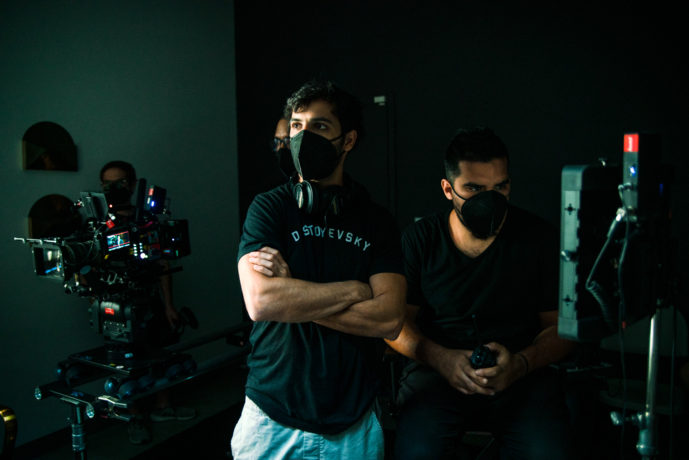
How did you get your start in filmmaking?
Diego Vicentini: I first did a month-long filmmaking program in New York during the summer after my freshman year at Boston College to see what part of filmmaking, if any, I liked. It was definitely writing, directing, and editing.
I was double majoring in Philosophy and Finance, but then I started taking film classes as well. After graduating I did a Master’s program in filmmaking in LA, and once that was over I started working on my first feature.
What stories, questions, or themes are you most drawn to telling and exploring in cinema?
Diego Vicentini: The movies I’ve always loved the most are the ones that make me think; the ones that keep giving upon a second and third viewing. I would love to make something that falls into that category.
Your feature film, Simón, tells the story of a student freedom fighter who fights to build his asylum case to stay in the US after escaping the control of a brutal Venezuelan dictatorship. It’s also based on a true story. When did you start writing this script, and how did you know that this was the first feature film that you wanted to make?
Diego Vicentini: This project first started as a short film about the same subject matter, which I made in 2018. The year prior had been a very violent year in Venezuela with protests and repression; many youngsters died on the streets. That motivated me to make the short film, and once it came out and I got to screen it in many countries and see the audience’s emotional reaction to it… that’s when I decided to make a feature about this subject matter. I started writing it in 2019, shot it in 2021, and finished post in 2023.
As the writer, director, and editor of the film, you control every part of the storytelling. What was it like to control all aspects of that?
Diego Vicentini: For better or for worse, everything I’ve ever made I have occupied all those roles, so in that sense, it was just like every other project. But I just enjoy each of those roles so much, it’s hard to think of giving any one of those up. Or maybe I just have trust issues. The downside though, is I can’t point a finger at anyone else for the flaws in the film.
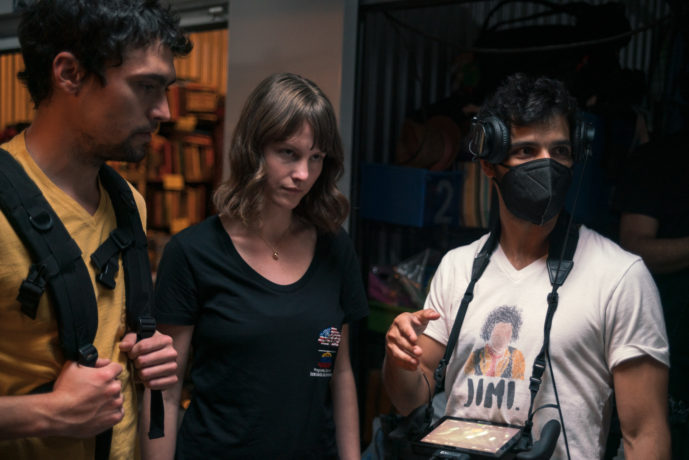
I’m ashamed to admit that I wasn’t aware of the magnitude of the devastation that Simón tells, that of the most significant exodus of people in the history of the Western hemisphere – 7.1 million people – leaving their homes in Venezuela to escape an oppressive and cruel government. Do you feel that Americans and the world are aware of the extent of this crisis that is currently happening in the world?
Diego Vicentini: I don’t think so. I think it’s taken 20 years of this situation in our country for the world to have a general awareness that things aren’t great in Venezuela, but I don’t think the details or scale is well-known or understood, though I don’t blame anyone for that. There is so much going on in the world, it’s impossible to keep up with everything everywhere.
But that’s precisely why I wanted to make this film; to raise awareness through entertainment. I think it’s a much easier ask to watch a movie than to read a text or article on the sociopolitical situation of a foreign country. Hopefully, this movie connects with audiences, and in the process, they come out a bit more informed and empathetic.
You don’t shy away from showing very brutal parts of cruelty by the government, including detentions, torture, and executions. What was your experience in writing and shooting those scenes?
Diego Vicentini: The hardest part wasn’t writing or shooting, but listening. Before I started writing, I interviewed several young men who had gone through that experience, of arbitrary detentions and torture; most of those scenes depicted come from real accounts I was told.
So the most difficult part was listening to another human being tell me what this regime had done to them, physically and psychologically. It just further fueled my drive to make this movie. On set, there was definitely a different atmosphere when shooting those scenes, as we were all aware that this was something real that not only happened but was still happening at the same time as we were shooting it.
A large part of the story centers around the guilt that Simón feels in leaving behind his home country. It made me think of Alejandro Iñárritu’s film Bardo, a personal story that similarly expresses the guilt of a man who left his home country behind. What is your relationship to the feeling of guilt? Is it something you feel still, or did making Simón help you process that?
Diego Vicentini: Guilt is very much at the core of all this. I left Venezuela when I was 15. Since then I’ve only watched from afar how the country has progressively plummeted into a humanitarian crisis at the hands of an oppressive authoritarian regime.
In 2017, millions took to the streets for over 100 days hoping to change things, and so many young men and women were killed. I felt so guilty, that I was in LA studying film, having a good life, while my generation was out there on the streets fighting for the country, risking their lives for our freedom. It’s that guilt that made me want to contribute to that fight in some kind of way, and my way was making Simón.
Making the movie has definitely helped me process all of this and have new realizations, though I’m not so sure that the guilt is gone.
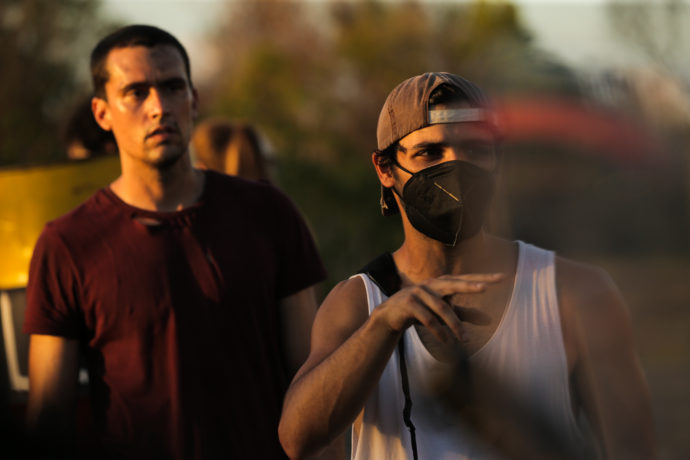
You’ve said that by making this film, you will no longer be able to go back to your home country. I can’t imagine how heartbreaking that decision must have been to know you would have to leave a part of your world behind. How important was making this film to you in that context?
Diego Vicentini: If my peers in Venezuela took to the streets, facing military tanks and gunfire, risking their lives for this cause, I thought the very least I could do was make this movie, regardless of what consequences it brought. They are the ones who are courageous and have made all the sacrifices. This movie is for all of them.
What do you miss the most about your home country, and what do you value the most having left?
Diego Vicentini: I left 14 years ago and since then I’ve traveled quite a bit. I’ve seen some wonderful landscapes and cities and monuments in these other countries, but it never comes with a sense of pride, because none of those things in those other countries “belong” to me. I miss my city and our people and our landscapes and being able to feel proud because those things “belong” to me, as a Venezuelan - those are ours. Our beaches. Our people. Our parties. Our traditions. Our mountains. I miss being able to feel that. I miss feeling I am in my land. I’m a foreigner everywhere else.
At one point, one of the oppressive government figures says to Simón, “When the people get tired, the protests stop,” and that “nothing will change.” It’s a frightening line to think about. What do you feel about the importance of protesting?
Diego Vicentini: That’s one of my favorite lines. Also one of the most painful ones. I think protesting is incredibly important and valuable, but it’s difficult to measure because when the objective has been to change the government and that hasn’t happened, it can feel like it’s useless, that it doesn’t work.
Not only that, many lost their lives in the process, so it’s very disheartening. But for change to occur, pressure needs to be exerted in the direction of that change. The vast majority of authoritarian autocrats have historically been removed by force. A significant percentage of those have been by power shifts within inner circles or military takeovers, but everyday citizens have no control over that.
One way the masses can take matters into their own hands and exert that pressure on a government is by protesting as it happened in Egypt.
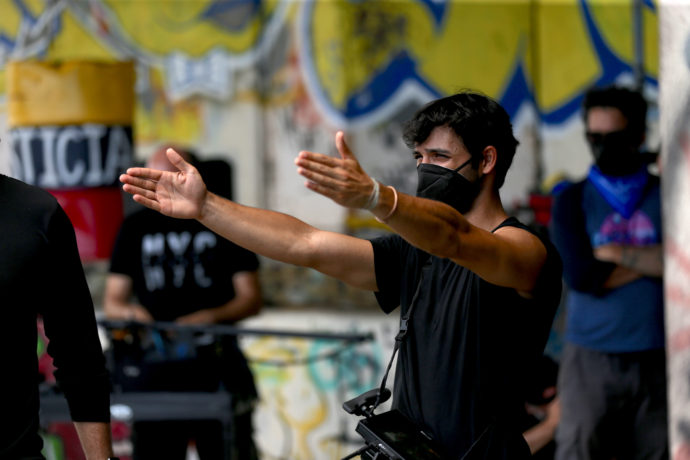
What have you learned as an artist and humanitarian following the making of Simón?
Diego Vicentini: I learned the value of making something that comes from a sincere and authentic place. Now that we have had a couple of screenings, I’ve been able to see and hear audiences react and connect to the feelings in the movie, and share that they too have felt that way and that it’s touched them.
It’s something I’ll take with me for my next projects - make sure I make something I care about and feel for, and most likely (or hopefully), it’ll filter into the movie and through the movie into the audience.
What three takeaways have you learned in your journey as a filmmaker so far that aspiring filmmakers should also know?
Diego Vicentini: From my very limited experience so far, I’d say, always shoot and practice. Make things you genuinely care about (not what you think others will care about), and love the process. It’s an extremely difficult career path, you have to love doing it absolutely.
Is there one message that you would want audiences to take away after watching Simón?
Diego Vicentini: The most important fights we’ll have are with ourselves. Healing from past trauma is one of those difficult fights, but utterly necessary to truly grow, move on, and keep fighting.
Simón is currently awaiting distribution.
Spider-Man: Across the Spider-Verse
Spider-Man: Across the Spider-Verse is an incredible, mind-blowing work of art that is also one of the best films of the year. The film dives even deeper into the concept of the multi-verse(s), and its spectacularly animated sequences reach dizzying new heights in this sequel to 2018's Into the Spider-Verse, which won the Oscar for Best Animated Feature Film.
The story continues with Miles Morales (Shameik Moore) as he continues to figure out his life as New York's newest Spidey. Zipping through cityscapes with the greatest of ease, his biggest struggle is balancing his teenage life: honoring his commitments to his mother (Luna Lauren Vélez) and soon-to-be-police chief father (Brian Tyree Henry), looking ahead to college and oh yeah, trying to save the world–all while keeping his identity a secret from those he loves.
The only ones who know Miles' true identity are the league of Spider-Men who helped teach him the ropes (webs?) after crash-landing into his universe in the previous film. All of the Spider-Men, including punky introvert Gwen Stacy (Hailee Steinfeld), are spread across different worlds.
The film opens with Gwen's origin story shown over an incredible drum-solo montage that also illustrates each world's specific visual style (Gwen's is a watercolor one, while Miles' ink-blotted world more readily resembles comics). After Gwen is attacked in her world by the universe-hopping villain Vulture (Jorma Taccone), she also unexpectedly meets a few more Spider-Men and women (Oscar Isaac as Spider-Man 2099 and Issa Rae). These heroes are part of a "Spider-Society" that protects the multi-verses from "canon disruptions." Wishing to leave her world behind, she pleads to join theirs. Against better judgment, she decides to pop over to Miles' world for a quick visit.
While Miles has matured since the first film, although still wise-cracking and perhaps a bit too cocky in his Spidey role, he underestimates the arrival of a clumsy new villain, Spot (Jason Schwartzman). Spot warns Miles that he is his new nemesis and holds him responsible for his genetic mutation; being covered in spots that he can use to travel through space (a result of the first film's universe collider).
A surprise visit from Gwen excites Miles, and the two web-sling around the city in friendly flirtatious fun. But when he sneakily follows her and her Spidey task force into a new universe (we travel to many in the film; buckle up) and disrupts a key moment in that world, he learns of an unintended truth that the Spider-Men share: some events, while tragic, are fated to happen and keep all of the universes connected and in order. Miles learns that he can't save everyone, a truth he struggles to accept and ultimately, doesn't.
Written by Phil Lord, Chris Miller, and Dave Callaham, Across the Spider-Verse takes Miles' story into even larger worlds and consequences. Directors Joaquim Dos Santos, Kemp Powers, and Justin K. Thompson's film explodes with dizzyingly brilliant animation that constantly feels like you're trying to hang on to a mechanical bull. With a runtime of 2 hours and 20 minutes, this is the longest American animated film to date. Across the Spider-Verse also claims to have the largest crew of any animated movie ever, with around 1,000 people working on it. It has 240 characters and takes place in six universes.
And yet, while it's the most wow-worthy and spectacular thing I've seen this year so far, it fails to capture the same heart as its predecessor Into the Spider-Verse did. Likely, there is too much going on. The first film was more self-contained, in that all of the action crash-landed into Miles's world. By the time we've jumped into our sixth universe, you do feel a sense of endless abandon that makes it difficult to remain emotionally connected to the looming threat lurking back in Miles's world.
Beyond the astounding animation, the vocal performances remain perfect and excellently cast. Shameik Moore returns as Miles, expressing the same boyish gusto with a bit more frustration and angst to color his world. Hailee Steinfeld as Gwen is given even more spotlight to express her story, which is the most heartfelt part of the film. Newcomers Oscar Isaac and Issa Rae are wonderful inclusions here too. Isaac specifically lends a bottled rage that turns troubling when we learn that his Spider-Man isn't exactly in Miles' corner.
Further shouts go to Daniel Kaluuya as Spider-Punk and Karan Soni as Indian Spider-Man Pavitr Prabhakar. And beyond all of the web-slingers, Miles's loving parents played by Brian Tyree Henry and Luna Lauren Vélez give the world a grounded, heartfelt center for Miles's story.
Spider-Man: Across the Spider-Verse is an incredible work of art that bursts with fun and visual wonder that proves the sequel game can remain strong (Beyond the Spider-Verse will return in March 2024).
2h 20 minutes. Rated PG for sequences of animated action violence, some language, and thematic elements.
https://youtu.be/shW9i6k8cB0
Beau Is Afraid
Film director Michelangelo Antonioni once said, "A film that can be described in words is not really a film." Since it's nearly impossible to describe the new dark comedy Beau Is Afraid (now playing in theaters nationwide), I suppose that makes this a film with a capital "F."
Beau Is Afraid is the story of one helplessly fear-stricken man's stress-inducing, anxiety-ridden, paranoia-packed odyssey to see his late mother amidst the threats of a harrowing world. Written and directed by Ari Aster, the film is equal parts absurd and visually astounding, and by its end will leave audiences speechless and confounded as to what they just experienced.
Beau (Joaquin Phoenix) is a sensitive, inept sadsack who lives in a comically uninhabitable version of New York's inner-city, constantly evading a world of psychos who threaten his everyday life. As Beau's misfortune would have it, on the day he is to visit his doting mother (who he admits smothered him since he was a child during a therapy session in the film's opening scene), he loses his keys, leaving him helpless to break the news that he is to stay home. When he receives the news of her unexpected demise just one day later, against all of his fears, he sets forth to journey to her through a world of dangers that lie in front of him.
Beau Is Afraid is a big bundle of childhood anxieties and unprocessed emotions wrapped up in a 2-hour and 59-minute runtime. It's also a fascinating journey through many imaginative and distinct worlds, including a deliriously deranged low-rent apartment building where he lives; a suburban home with suspiciously kind parents (Amy Ryan and Nathan Lane); a forest-turned-full-on animated parable; and then a nightmare-ending that is the film's most head-spinning part.
Audiences are likely familiar with writer-director Ari Aster's previous films, Hereditary (2018) and Midsommar (2019), which were both equally polarizing and shocking for their depictions of horror and traumas around the devastating losses of family. Beau Is Afraid is a painfully punishing movie that stuffs guilt, trauma, and physical injury upon its lead character, and Joaquin Phoenix is up to the challenge. Pushing his bloated body to the brink through physical and psychological torture, Phoenix is nothing short of amazing here. He's joined by comic performances from Nathan Lane and Amy Ryan, as well as Stephen McKinley Henderson as Beau's therapist. In its last, and most WTF section, Parker Posey and Patti LuPone show up to push the film over its edge of sanity.
Beau Is Afraid is a work of incredible artistry (indie distributor A24 should get a special mention for producing a movie that is so defiantly unique, challenging, and original–much like how they did with last year's Everything Everywhere All At Once). It's been fun to talk about Beau Is Afraid, and its word-of-mouth seems to continue to grow, making for conversations around this deranged psychoanalytic dive into unprocessed childhood trauma that Freud would have a field day dissecting.
If you're looking for a dose of easily watchable popcorn entertainment, this film is not for you. Whether you end up loving or hating it, don't be afraid to check it out for yourself.
2h 59m. Rated R for strong violent content, sexual content, graphic nudity, drug use, and language.
https://youtu.be/PuiWDn976Ek

